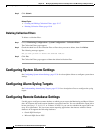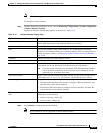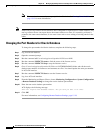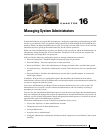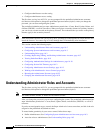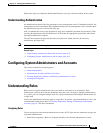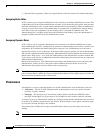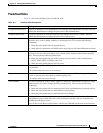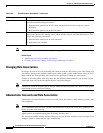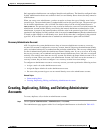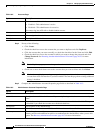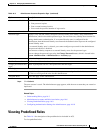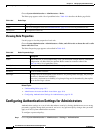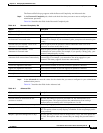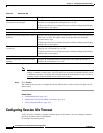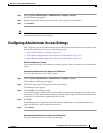
16-6
User Guide for Cisco Secure Access Control System 5.4
OL-26225-01
Chapter 16 Managing System Administrators
Understanding Roles
Note At first login, only the Super Admin is assigned to a specific administrator.
Related Topics
• Administrator Accounts and Role Association
• Creating, Duplicating, Editing, and Deleting Administrator Accounts
Changing Role Associations
By design, all roles in ACS are predefined and cannot be changed. ACS allows you to only change role
associations. Owing to the potential ramifications on the system’s entire authorization status, the ACS
Super Admin and SecurityAdmin roles alone have the privilege to change role associations.
Changes in role associations take effect only after the affected administrators log out and log in again.
At the new login, ACS reads and applies the role association changes.
Note You must be careful in assigning the ACS Super Admin and SecurityAdmin roles because of the global
ramifications of role association changes.
Administrator Accounts and Role Association
Administrator account definitions consist of a name, status, description, e-mail address, password, and
role assignment.
Note It is recommended that you create a unique administrator for each person. In this way, operations are
clearly recorded in the audit log.
Administrators are authenticated against the internal database only.
You can edit and delete existing accounts. However, the web interface displays an error message if you
attempt to delete or disable the last super administrator.
SystemAdmin This role is intended for administrators responsible for ACS system configuration and operations.
This role has the following permissions:
• Read and write permissions on all system administration activities except for account
definition
• Read and write permissions on ACS instances
UserAdmin This role is intended for administrators who are responsible for adding, updating, or deleting
entries in the internal ACS identity stores, which includes internal users and internal hosts. This
role has the following permissions:
• Read and write permissions on users and hosts
• Read permission on IDGs
Table 16-1 Predefined Role Descriptions (continued)
Role Privileges



